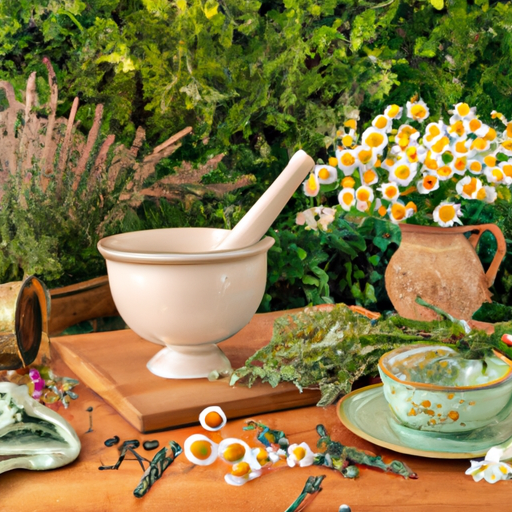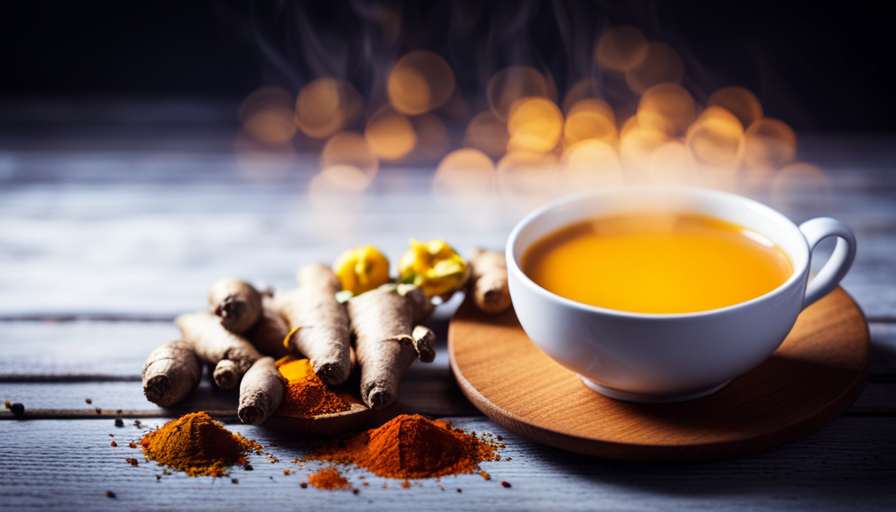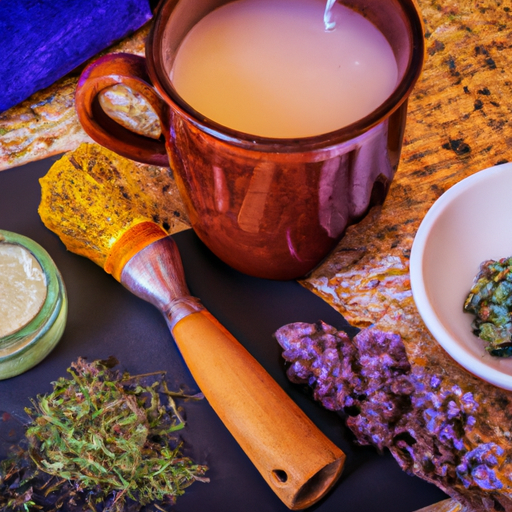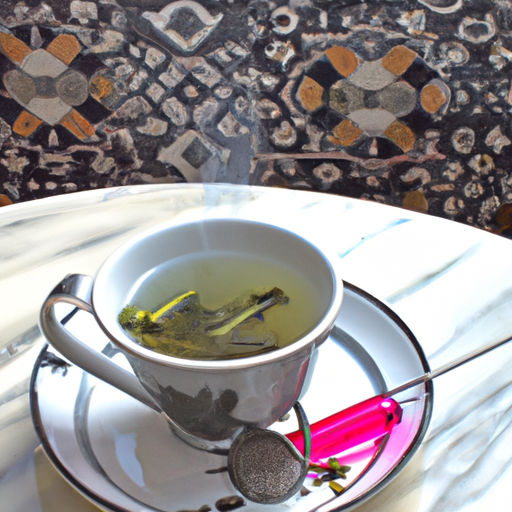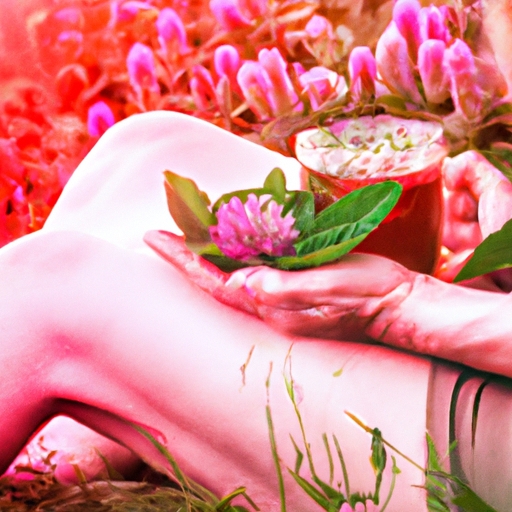Since finding the pleasure of growing my own herbal tea, my mornings are now more peaceful and afternoons more invigorating.
Picture this: you wake up, step outside, and pluck a few leaves of fresh peppermint. As the hot water cascades over the leaves, a calming aroma fills the air, preparing you for the day ahead.
Growing your own herbal tea is not only a rewarding experience but also a way to connect with nature and nurture your well-being.
In this article, I will guide you through the process of creating your own herbal tea garden, from choosing the right herbs to harvesting and drying them. With a little care and patience, you can transform your backyard into a sanctuary of flavors and fragrances.
So grab your gardening gloves and let’s embark on this journey together.
Key Takeaways
- Choosing the right herbs for your tea garden is important for flavor and personal preference.
- Select herbs that thrive in your climate and gardening conditions for success.
- Harvest herbs in the morning after the dew has dried for peak flavor.
- Hang herbs upside down in a cool, dry place to air dry and preserve flavors.
Choose the Right Herbs for Your Tea Garden
Choosing the right herbs for your tea garden will infuse your cup with a burst of natural flavor that’ll transport your taste buds to a state of pure bliss.
When it comes to choosing herbal tea blends, the options are endless. Start by considering your personal preferences and the flavors you enjoy. If you’re a fan of floral notes, chamomile and lavender are excellent choices. For a refreshing and zesty taste, try mint or lemon verbena. If you prefer a more earthy and grounding flavor, consider growing herbs like rosemary or sage.
Don’t be afraid to experiment with different flavors to find your perfect blend. Mix and match herbs to create unique and delicious combinations. For example, a blend of chamomile, mint, and lavender can create a soothing and calming tea perfect for relaxation. Or, try combining lemon verbena with rosemary for a refreshing twist.
As you choose your herbs, keep in mind their growth habits and requirements. Some herbs, like mint, can be quite invasive and may need to be contained in a pot. Others, like chamomile, prefer full sun and well-drained soil. By selecting herbs that thrive in your climate and gardening conditions, you’ll set yourself up for success.
Now that you’ve chosen the perfect herbs for your tea garden, it’s time to prepare your garden space and get ready to grow your own herbal tea.
Prepare Your Garden Space
When preparing your garden space for growing herbs for your tea garden, it’s important to find a sunny spot with well-draining soil. Herbs thrive in sunlight, so choosing a location that receives at least six hours of direct sunlight each day is crucial.
Additionally, make sure to clear the area of any weeds and debris that may hinder the growth of your herbs. This will ensure that your plants have the best chance of flourishing and producing flavorful leaves for your homemade tea.
Find a sunny spot with well-draining soil
To create a thriving herbal tea garden, scout out a sunny spot with soil that allows water to easily pass through. Choosing the right herbs for your tea garden is essential. Consider herbs like chamomile, mint, lavender, and lemon balm, which are popular choices for tea enthusiasts.
Once you’ve identified the herbs you want to grow, it’s time to prepare the garden space. Find an area that receives at least six to eight hours of direct sunlight per day. This will ensure that your herbs receive the necessary light for optimal growth. Additionally, make sure the soil is well-draining to prevent waterlogging, which can lead to root rot and other issues.
Now that you have found the perfect sunny spot with well-draining soil, it’s time to clear the area of weeds and debris, creating a clean and healthy environment for your herbal tea garden to thrive.
Clear the area of weeds and debris
Now that you’ve found the perfect sunny spot with well-draining soil, it’s time to roll up your sleeves and clear the area of those pesky weeds and debris. This will create a pristine canvas for your thriving herbal tea sanctuary.
Clearing weeds and debris is crucial because it allows your herbal tea plants to grow without competition for nutrients and sunlight. Start by removing any large pieces of debris and then focus on the weeds. To effectively remove weeds, you can use tools such as a garden hoe or a hand trowel. Make sure to dig deep and remove the entire root system to prevent regrowth. If the area is heavily infested, you may consider using an organic weed killer.
Once the area is clear, you are ready to plant your herbal tea garden and watch it flourish with aromatic herbs and soothing teas.
Plant Your Herbal Tea Garden
First, choose a sunny spot in your garden and gather the necessary materials, like soil, pots, and seeds. Did you know that herbal tea is the most consumed beverage in the world after water? Creating a well-designed herbal tea garden can not only provide you with a continuous supply of fresh, organic herbs but also add beauty and fragrance to your outdoor space.
Start by planning the layout of your garden, keeping in mind the space needed for each herb to grow properly. Consider using raised beds, containers, or even a dedicated corner of your garden. Once you’ve decided on the design, prepare the soil by removing any weeds and loosening it with a garden fork.
Next, plant your chosen herb seeds or seedlings according to the instructions on the packet. Remember to leave enough space between each plant to allow for growth. Water the newly planted herbs gently, making sure the soil is moist but not waterlogged.
Now you’re ready to care for your plants and watch them thrive. Transitioning into the next section, proper care is essential to ensure a bountiful harvest of aromatic herbs that’ll make delicious herbal teas.
Care for Your Plants
Take a moment to nurture and tend to your thriving plants, ensuring they receive the care they need to flourish and provide you with an abundance of aromatic herbs. Here are some essential tips to help you care for your herbal tea plants:
-
Watering techniques: Proper watering is crucial for the health of your plants. Make sure to water them consistently, keeping the soil moist but not waterlogged. Avoid overwatering, as it can lead to root rot. Consider using a drip irrigation system or watering at the base of the plants to prevent wetting the leaves, which can invite diseases.
-
Dealing with pests: Just like any other garden, herbal tea plants are susceptible to pests. Keep a close eye on your plants and promptly address any pest issues. You can use natural remedies like neem oil or insecticidal soap to control common pests such as aphids or spider mites. Regularly inspect the leaves for any signs of damage or infestation.
-
Provide proper sunlight: Most herbal tea plants thrive in full sun, so make sure they receive at least six hours of direct sunlight each day. If you’re growing them indoors, place them near a bright window or use grow lights to simulate sunlight.
By following these care techniques, you’ll ensure that your herbal tea plants grow strong and healthy.
In the next section, we’ll explore how to harvest and dry your herbs, preserving their flavors for future use.
Harvest and Dry Your Herbs
When it comes to harvesting and drying herbs for herbal tea, it’s important to follow a few key steps.
First, I always make sure to harvest my herbs in the morning, after the dew has dried. This ensures that the herbs are at their freshest and most flavorful.
Next, I hang the herbs upside down in a cool, dry place to allow them to air dry. This method helps to preserve the herbs’ natural oils and flavors.
By following these steps, I’m able to consistently enjoy a fresh and delicious cup of homemade herbal tea.
Harvest herbs in the morning after dew has dried
After the dew has dried, it’s the perfect time to harvest your herbs for brewing your own herbal tea. Harvesting in the morning ensures that the flavor and aroma of the herbs are at their peak.
To preserve the freshness of your harvested herbs, it’s important to handle them gently to avoid bruising or damaging the leaves. You can use a pair of sharp scissors or garden shears to cut the stems just above the node, where new growth is occurring. This technique encourages the plant to continue producing more leaves.
Additionally, it’s crucial to only harvest one-third of the plant at a time to promote regrowth.
By following these tips, you can maximize the flavor of your herbal tea and ensure a continuous supply of fresh herbs.
Once harvested, hang the herbs upside down in a cool, dry place to dry them further and prepare them for storage and future use.
Hang herbs upside down in a cool, dry place
To preserve the flavor and aroma of your freshly harvested herbs, gently hang them upside down in a cool, dry place, like a bat hanging from a cave ceiling.
This method, known as air drying, is one of the best ways to dry herbs for tea. By hanging the herbs upside down, you allow air to circulate around them, which helps to remove moisture and prevent the growth of mold or bacteria. Hanging herbs also allows them to retain their vibrant colors and delicate flavors.
Additionally, air drying helps to concentrate the essential oils in the herbs, enhancing their therapeutic properties. There are other methods for drying herbs, such as using a dehydrator or oven, but hanging herbs is a traditional and effective approach.
Once your herbs are dry, you can move on to the next step of storing and using your herbal tea.
Store and Use Your Herbal Tea
Get ready to enjoy your homemade herbal tea by learning how to store and use it! Storing your herbal tea properly is key to maintaining its freshness and potency. After your herbs have dried and you’ve removed them from the stems, it’s important to store them in an airtight container in a cool, dark place. This will help preserve their flavor and aroma.
I recommend using glass jars with tight-fitting lids to keep moisture and light out. Label each jar with the name of the herb and the date it was harvested to keep track of freshness.
When it comes to using your herbal tea, there are endless possibilities. You can simply steep a teaspoon of your dried herbs in hot water for a soothing cup of tea. Experiment with different combinations of herbs to create your own unique blends. Not only will you enjoy the delicious flavors, but you’ll also reap the health benefits that herbal tea provides. From calming chamomile to invigorating peppermint, each herb possesses its own set of medicinal properties.
Now that you know how to store and use your herbal tea, it’s time to sit back, relax, and enjoy the fruits of your labor. Whether you’re seeking a natural remedy for a specific ailment or simply looking for a comforting beverage, your homemade herbal tea is sure to satisfy. So go ahead and indulge in a cup of nature’s goodness!
Enjoy Your Homemade Herbal Tea
Now that you have learned how to store and use your homemade herbal tea, it’s time to sit back, relax, and enjoy the fruits of your labor. There’s nothing quite as satisfying as sipping on a warm cup of herbal tea that you have grown and brewed yourself. Not only does it taste delicious, but it also provides a myriad of health benefits.
Herbal tea is not only a tasty beverage, but it also offers a natural way to improve your overall well-being. Depending on the herbs you choose, you can create homemade teas that address specific health concerns or simply provide a general boost to your immune system. From soothing chamomile to invigorating peppermint, the possibilities are endless.
To help you get started on your herbal tea journey, I have created a handy table below that features three homemade tea recipes and their corresponding health benefits. This table will serve as a helpful guide as you explore different flavors and their associated advantages.
| Tea Recipe | Health Benefit |
|---|---|
| Chamomile and Lavender Tea | Promotes relaxation and better sleep |
| Ginger and Turmeric Tea | Reduces inflammation and aids digestion |
| Lemon Balm and Peppermint Tea | Relieves stress and improves digestion |
So go ahead, experiment with different combinations of herbs and create your own unique homemade tea recipes. Your taste buds and your body will thank you!
Frequently Asked Questions
Can I grow herbal tea plants indoors?
Yes, you can grow herbal tea plants indoors. Indoor herbal tea plant care involves providing adequate sunlight, watering regularly, and using well-draining soil. Growing herbal tea indoors offers benefits like easy access to fresh tea leaves and a year-round supply of aromatic teas.
How long does it take for herbal tea plants to grow?
Herbal tea plants typically take between 4-6 weeks to reach a mature size. To ensure optimal growth, it’s important to prune them regularly by trimming back any overgrown or dead branches. Additionally, providing the best growing conditions, such as adequate sunlight and well-draining soil, will promote their overall health and productivity.
Do I need to fertilize my herbal tea plants?
Yes, it is important to fertilize herbal tea plants. There are various fertilizer options available, including organic and synthetic choices. Best practices for herbal tea plant care include using a balanced fertilizer and following the recommended feeding schedule.
Can I use any type of soil to plant my herbal tea garden?
You can use various types of soil to plant your herbal tea garden, such as loamy, sandy, or well-draining soil. To maintain soil health, ensure proper drainage, add organic matter, and avoid over-watering.
Can I grow herbal tea plants from seeds or do I need to buy established plants?
Growing herbal tea plants from seeds has the advantage of cost and variety, but it requires patience and time. Buying established plants ensures immediate results, but it can be more expensive. Tips for successful indoor growth include proper lighting, temperature, and watering.
Conclusion
In conclusion, growing your own herbal tea garden is a rewarding and fulfilling experience. Not only does it allow you to have a fresh supply of tea at your fingertips, but it also provides numerous health benefits.
Did you know that drinking herbal tea can help boost your immune system and reduce stress? It’s true! By incorporating herbal teas into your daily routine, you can improve your overall well-being and enjoy the soothing effects of nature’s remedies.
So why not start your own tea garden today and reap the benefits of this ancient practice?

